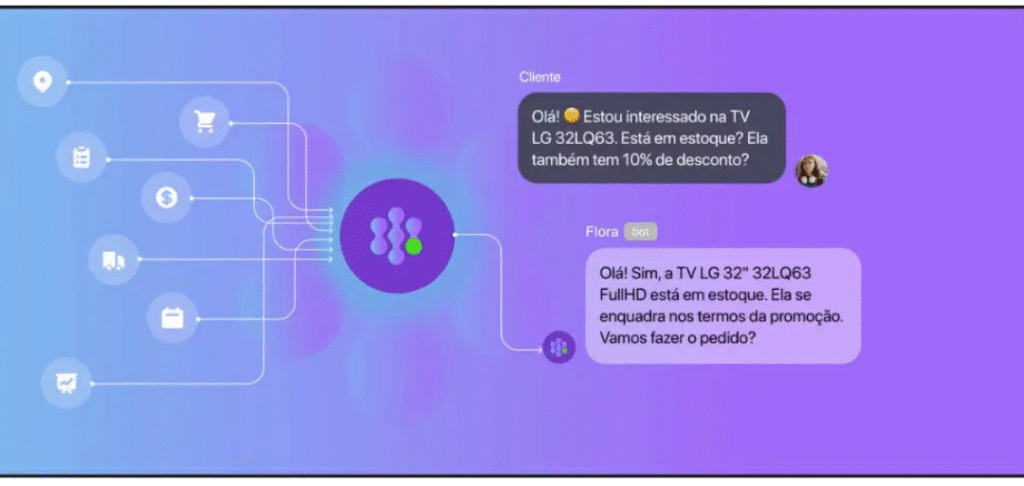E-commerce in Brazil changed completely after the pandemic, with an 80.9% increase in 2020 compared to 2019. This change has made consumers accustomed to online shopping, and in 2024, the number of online shoppers reached 91.3 million, with the sector closing the year with a turnover of around R$ 204.3 billion, according to data from E-commerce Brasil.
Now, with advances in artificial intelligence, e-commerce is undergoing a new transformation, with these tools becoming part of everyday life. To give you an idea, 89% of store owners already use AI tools in their daily operations, according to a study by DemandSage.
With these changes comes Agentic Commerce, an evolution of traditional automation models. Instead of offering only chatbots with programmed responses, this approach brings autonomous AI agents capable of managing the entire customer interaction cycle.
In this article, you will understand what Agentic Commerce is, how it works, and the benefits and challenges of this innovation. Check it out!
What is Agentic Commerce and how does it work?
Agentic Commerce is a new e-commerce concept built with autonomous artificial intelligence, where AI agents act independently, making decisions, executing actions, and interacting with areas such as payments, inventory, and customer service.
This model is an evolution from traditional e-commerce. Conventional automation is limited to isolated tasks such as responding to messages or suggesting products.
Agentic Commerce connects different systems, allowing agents to learn from data and act proactively, adjusting strategies according to consumer behavior.
In short, these agents function as autonomous digital operators, capable of monitoring customer behavior, identifying preferences, anticipating demands, and adapting campaigns, prices, and offers in real time.

Why invest in Agentic Commerce?
More than just a passing trend, Agentic Commerce represents a turning point in how digital retail operates.
The advancement of generative AI, combined with automation and the use of open APIs, is creating an environment in which businesses become truly intelligent organisms capable of learning, deciding, and acting independently.
Ignoring this movement could mean losing competitiveness. Just as mobile commerce redefined consumption a few years ago, Agentic Commerce promises to profoundly transform the relationship between brands and consumers, raising the standards of personalization and response speed.
How consumers can interact with Agentic Commerce
Shopping agents act as personalized digital assistants, whether on websites, chatbots, or apps such as WhatsApp, helping customers throughout the entire process, from product discovery to after-sales support.
If you want to automate your customer service on WhatsApp, JivoChat offers integration with WhatsApp Business that allows you to streamline customer service and make sales directly through the app. Learn more about JivoChat.
Product discovery
With these agents, the purchasing process becomes more intuitive and faster. Instead of browsing through filters and categories, users can chat naturally with the assistant, saying, for example: “I’m going camping in the south of the country. Can you recommend equipment and supplies up to $500 in total?”
The agent understands the request and presents the best options based on inventory and the buyer’s preferences. For retailers, the benefit is clear: less browsing time, faster conversion, and increased average ticket size.
Personalized recommendations
These agents also use behavioral data, purchase history, and individual preferences to offer tailored suggestions.
For example, if the user is looking for a new pair of running shoes, the agent can recommend ideal models based on terrain, size, and running style. This improves the customer experience and strengthens loyalty.
Order management and support
In addition to assisting with purchases, agents can track orders, answer questions about deliveries, and even manage exchanges or returns automatically. This enables brands to reduce support costs, lower return rates, and increase customer satisfaction.
What are the advantages of Agentic Commerce?
As we have seen so far, Agentic Commerce offers a robust set of strategic benefits for companies that want to innovate and scale their digital operations.
This approach represents a new era of e-commerce, where decisions are made autonomously and based on real-time data. Among the main benefits observed, the following stand out:
More agile and assertive decisions
In this model, intelligent agents process a huge volume of information simultaneously, learning and adapting from it.
As a result, adjustments to campaigns, promotions, and pricing occur automatically, without relying on manual validation, making operations more dynamic and responsive.
Significant cost reduction
By automating repetitive and analytical activities, Agentic Commerce reduces the operational burden and optimizes the use of human resources. This allows teams to focus on high-impact strategies, while agents take care of daily execution with efficiency and precision.
Financial and logistical optimization
Thanks to integration with payment, management, and forecasting systems, independent agents can anticipate failures, monitor cash flows, and adjust credit terms or conditions according to customer behavior, ensuring a more stable and predictable operation.
Where can you apply Agentic Commerce in your business?
Agentic Commerce can operate in virtually every stage of the digital operation, from marketing to after-sales service.
When connected to company systems such as CRM, ERP, payment gateways, and inventory management, it creates a fully autonomous ecosystem capable of responding in real time to market demands.
Without the need for human intervention, the system can automatically adjust prices, suggest relevant products, identify potential stock shortages, and even optimize negotiations with suppliers.
In addition, agents analyze consumer behavior to tailor campaigns, offers, and communications, providing highly personalized experiences and increasing satisfaction at every point in the shopping journey.
What are the disadvantages of Agentic Commerce?
Despite its enormous potential, adopting this model requires technical and strategic preparation. Integrating autonomous agents into operations demands structural and cultural adjustments that go far beyond simple technological implementation.
Integration
The first major obstacle is connecting ERP, CRM, and e-commerce platform systems so that they can communicate with autonomous agents in real time. This requires well-structured APIs, organized data, and a scalable architecture that supports continuous AI learning without compromising website or store performance.
Governance, security, and ethics
With agents making decisions independently, the importance of human supervision grows. It is necessary to establish security guidelines, audit protocols, and transparency policies that ensure control over every action performed by AI.
This avoids risks and ensures that decisions remain consistent and ethically responsible.
Costs
As it is new to the market, its use may involve considerable initial investments in infrastructure and staff training.
However, when implemented gradually and in a planned manner, the return tends to be significant. Especially when it comes to efficiency, personalization, and customer loyalty.
Have you discovered what Agentic Commerce is?
We hope this article has helped you learn about this new technology and how to use artificial intelligence to increase automation in your business.
Do you want to optimize and automate your customer service? Discover JivoChat’s AI Agent. This agent is much more than a regular chatbot; it is a virtual assistant capable of understanding context and offering truly relevant interactions.
With JivoChat’s AI Agent, you can create several independent agents, each with their own sources of information. This allows you to configure specific customer service for each department, product line, or customer profile, ensuring more targeted and accurate communication.

It allows you to train the bot with up to five files (PDF, DOC, and other formats) or links to specific pages, such as products, internal policies, knowledge bases, or any other content that helps personalize responses.
The AI Agent is not limited to your company’s website; it can also operate on channels such as WhatsApp, Instagram, Telegram, Facebook Messenger, and others. Everything is managed in a unified way, in a single panel, making it easy to control and monitor conversations.
With intelligent automation, the agent can resolve up to 80% of requests on its own, which reduces the volume of manual service calls and allows your team to focus on more complex and strategic cases. The result is lower operating costs and greater service efficiency.

